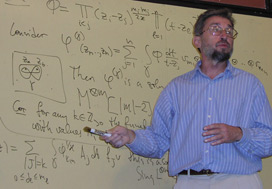Specialized Study, Dissertation Advisor, and the General Exam

By the time you have passed the Comprehensive Exam at the PhD Qualifying level, you may have developed a preference for one area of Mathematics over the others. You may have sampled some of the Department's advanced courses (beyond the Core courses). During the year following the passing of the Comprehensive Exam, you are expected to select a field within Mathematics for specialized reading and study leading toward an eventual dissertation. For this, it is essential that you have a Dissertation Advisor. You should take the General Exam by the end of this same year.
Picking a specialty and finding a Dissertation Advisor are closely related processes. There is no set, formal way of going about this. If you already have a clear idea of your intended specialization, you need to determine which faculty have research specialties in that area. You may have met such a faculty member through your regular courses or through individual reading courses (Math 7999). To take an individual reading course, you need the agreement of the Professor who will supervise that course. A Professor whom you would like to have as a Dissertation Advisor will probably want to get to know your work through teaching you in a regular course, a reading course, or both, before making a commitment. Dissertation research is an extremely challenging experience, and it is essential that both the Student and Professor are comfortable working together on a long- term basis. No one can promise you successful completion of a research project. But, when your advisor accepts you as his or her student, this shows the advisor's belief that you have the ability to earn a PhD, provided you work very hard, produce your best creative efforts, and remain determined to the finish. Some advisors may already have so many dissertation students that they cannot responsibly accept more until some of the current students complete their work. In such a case you will want to know who else in the Department works in the same or a closely related specialty. You may wish to review the list of Research Groups which is posted on the Graduate Web Site or discuss the matter with the Graduate Director.
Once you have the agreement of a Professor to serve as your Dissertation Advisor, you should inform the Graduate Director of this arrangement. You and your advisor will select at least two Department faculty members (other than your Advisor, who is Chair) to form your General (and Final) Examination Advisory Committee.
You should also make plans with your Advisor as to when you will take the General Exam—preferably by the end of the year following the Comprehensive Exam, and before the end of the third year of enrollment. You will need to submit the Graduate School's Application for the General Exam with sufficient lead-time as required by the Graduate School. The Graduate Dean will appoint a Dean's Representative from another Department to serve on your Exam Committee, and it will be your responsibility to notify the Dean's Representative of the time, place, and format of the Exam.
Your Advisor will make certain decisions regarding the format of your General Exam. This is always an oral examination conducted by the Exam Committee. There is no rule governing the duration of the General Exam, but it is usually in the neighborhood of two hours long. Some Advisors want their students to begin the Exam with a brief expository talk reflecting the advanced reading they have been doing. In any case, the Committee members may ask any mathematical questions they deem appropriate. It is a good idea to talk in advance with each of your Committee Members about the general area of Mathematics about which he or she will probably question you. Most students feel at least slightly anxious about an oral exam. Actually, it is an informal process which has many advantages over a written exam. It is alright not to know how to answer some of the questions, and it is also alright to get hints or reminders to get you started on a solution. It is best to try to relax, not be afraid of thinking on your feet nor of making some mistakes. The Committee Members will be looking for `mathematical maturity' which you have developed in your studies—you don't need to come up with instant polished proofs or solutions! In any case, this is your last general examination in Mathematics. The Final Examination for the PhD is a Dissertation Defense, and is an occasion to present your results to your Advisory Committee for its approval.
When you have passed the General Exam, your Committee members will sign two copies of the Graduate School's Exam Cards. Your Advisor should give these signed cards to the Graduate Secretary of the Department, who will copy them for the Department's records prior to sending them to the Graduate School.